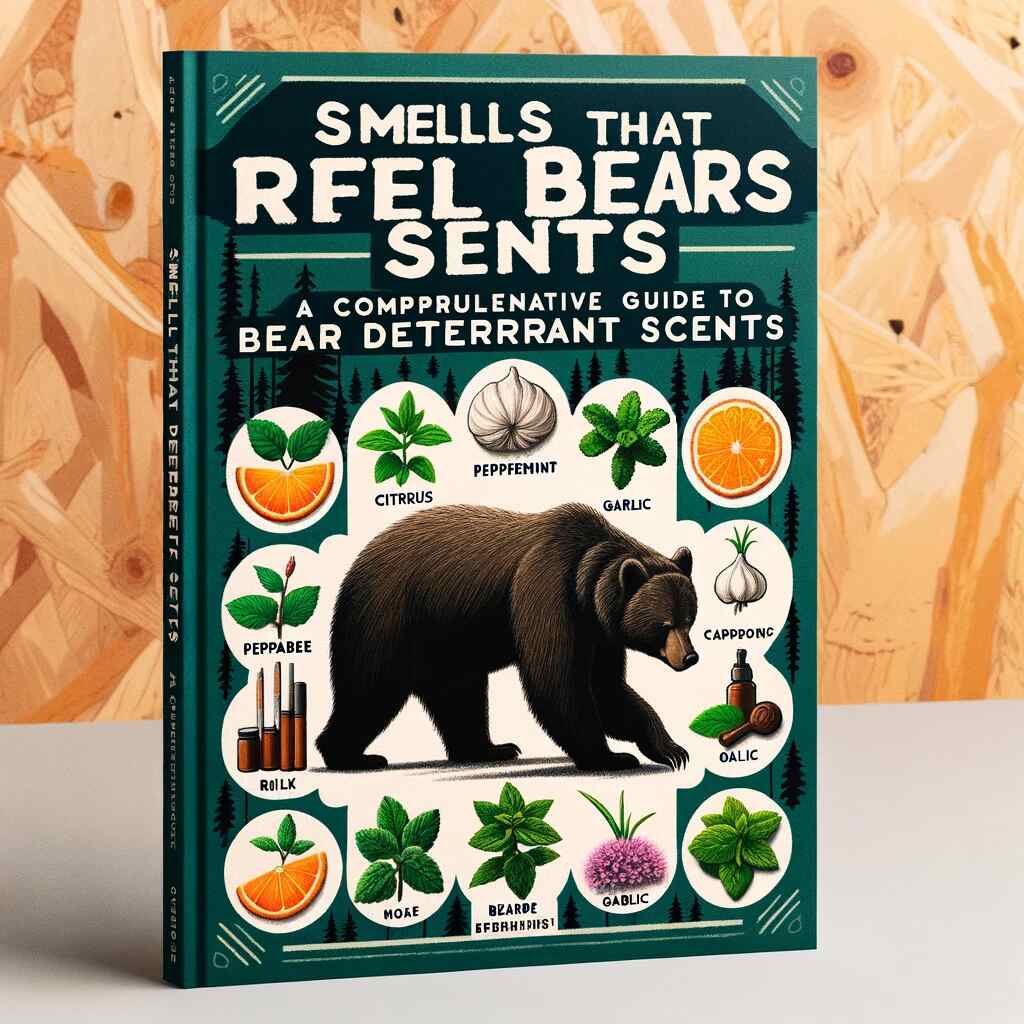Bears have an extraordinary sense of smell, often described as seven times more sensitive than that of a bloodhound. Their olfactory abilities are vital for finding food, identifying potential threats, and communicating with other bears. This keen sense of smell makes bears curious about new odors, but it also means that certain scents can deter them from approaching human campsites, homes, or food sources.
Smells that repel bears include citrus fruits like lemons and oranges, peppermint, ammonia, vinegar, and garlic. These potent scents can overwhelm a bear’s sensitive sense of smell, discouraging them from approaching areas where these smells are prevalent.
The search for effective bear deterrent scents has led to various studies and anecdotal evidence. While no scent can guarantee absolute protection, some have shown promise in deterring bears and preventing dangerous encounters.
The Scents That Bears Don’t Like
When it comes to selecting a scent that repels bears, it’s essential to focus on smells that bears find unpleasant or threatening. While the effectiveness of these scents can vary depending on the bear species and individual bear behavior, here are some commonly recognized bear deterrent smells:
1. Pepper Spray
Pepper spray is a popular and widely recommended bear deterrent. It contains capsaicin, a compound found in chili peppers, which causes intense irritation when inhaled or applied to the skin. Bears dislike the burning sensation it creates and tend to avoid areas where it’s been deployed.
2. Ammonia
Ammonia has a pungent and harsh odor that bears typically find unpleasant. It can be used in various forms, such as soaked rags or ammonia-soaked cotton balls, to create a barrier or scent deterrent around your campsite or property.
3. Mothballs
Mothballs contain naphthalene, a chemical compound with a strong, distinctive odor. While not specifically designed as a bear deterrent, the smell of mothballs is generally unpleasant to bears, and they may avoid areas where mothballs are present.
4. Bleach
The strong and chemical odor of bleach can be an effective bear deterrent. Dilute bleach with water and use it to clean outdoor areas, trash cans, or food storage containers to remove attractive scents that might draw bears in.
5. Human Urine
Human urine contains ammonia and other compounds that bears may associate with danger. Some experts recommend strategically placing human urine around your campsite to deter bears, although its effectiveness varies.
Scents That Deter Black Bears
Black bears are one of the most common bear species in North America and can be found in a wide range of habitats. While the deterrent scents mentioned above can be effective against black bears, there are some additional options that may work specifically well against them:
6. Mint
Black bears have been known to have an aversion to the strong scent of mint. Planting mint around your property or campsite or using mint-scented sprays can help deter black bears from approaching.
7. Citrus
The strong, citrusy smell of oranges, lemons, or grapefruits can be unpleasant to black bears. Consider using citrus-scented cleaning products or placing citrus peels in strategic locations to create a bear-repelling barrier.

Strategies for Using Bear Deterrent Scents
Using bear deterrent scents effectively requires careful planning and consideration of your specific situation. Here are some strategies to keep in mind:
1. Bear-Proof Food Storage
One of the most common reasons bears venture near human habitats is the scent of food. To prevent bear encounters, always store food in bear-resistant containers, lockers, or bear bags. Additionally, consider using bear deterrent scents around your food storage area to further discourage curious bears.
2. Campsite Perimeter
When camping in bear country, create a perimeter around your campsite with the chosen bear deterrent scents. This can help keep bears at a distance and reduce the likelihood of them approaching your camp.
3. Garbage Management
Properly secure garbage and waste. Bears are attracted to the smell of trash, so ensure that your garbage cans are bear-resistant and clean. Using bleach or ammonia to clean your trash bins can help mask odors that might attract bears.
4. Maintain Cleanliness
Keep your campsite, outdoor kitchen, and cooking utensils clean. Bears have an excellent sense of smell, and even small food particles or residue can attract them.
5. Consistency
Consistency is key when using bear deterrent scents. Refresh or replace the scents regularly to ensure their effectiveness. Rain, wind, and time can reduce the potency of these smells.
Bear Deterrent Scent Products
To make it more convenient for outdoor enthusiasts and homeowners, several bear deterrent scent products are available on the market. These products are designed specifically to repel bears and can be a valuable addition to your bear safety toolkit. Here are a few examples:
1. Bear Spray
Bear spray is a highly effective and convenient way to deter bears. It typically contains capsaicin and can be sprayed directly at a bear if it approaches too closely. Always follow the manufacturer’s instructions when using bear spray.
Recommended Bear Spray: Counter Assault Bear Deterrent Spray
- EPA-registered
- 30-foot spray range
- Includes a holster for quick access
2. Bear Deterrent Sprays
Bear deterrent sprays are designed to create a barrier around your campsite or property. They release a cloud of odor that is unpleasant to bears and discourages them from approaching. These sprays can be a valuable tool for creating a protective perimeter.
Recommended Bear Deterrent Spray: Bonide Repels-All Animal Repellent Spray
- Natural ingredients
- Repels a variety of animals, including bears
- Lasts up to 2 months
3. Bear-Resistant Trash Bins
Investing in bear-resistant trash bins is an excellent way to keep bears away from your garbage. These bins are designed to withstand bear attempts to access the contents, and their sealed design helps contain odors.
Recommended Bear-Resistant Trash Bin: Bearicuda Bin Bear-Proof Trash Can
- Certified bear-resistant by the Interagency Grizzly Bear Committee
- Locking mechanism keeps bears out
- Durable, weather-resistant design
4. Electric Fencing
Electric fencing is a highly effective way to keep bears out of specific areas, such as gardens or livestock enclosures. The shock delivered by the fence acts as a strong deterrent, discouraging bears from attempting to breach the barrier.
Recommended Electric Fence: Gallagher S10 Solar Electric Fence Charger
- Portable and solar-powered
- Suitable for small to medium enclosures
- Weatherproof casing
Natural Scents vs. Synthetic Scents
When choosing bear deterrent scents, you might wonder whether natural or synthetic scents are more effective. While both types can be effective, natural scents tend to be more environmentally friendly and less harmful to humans and wildlife. Synthetic scents may contain chemicals that can have unintended consequences, so it’s essential to use them with caution.
Limitations of Bear Deterrent Scents
While bear deterrent scents can be a valuable tool in bear safety, it’s crucial to understand their limitations:
1. Variable Effectiveness
The effectiveness of bear deterrent scents can vary depending on individual bears, their previous experiences, and environmental factors. Some bears may be more deterred by certain scents than others.
2. Habituation
Bears can become habituated to certain scents over time. If they repeatedly encounter a particular smell without experiencing negative consequences, they may become less responsive to it.
3. Not a Guarantee
Bear deterrent scents are not a guarantee that bears will stay away. They should be used as part of a comprehensive bear safety strategy that includes proper food storage, awareness, and avoidance of bear encounters.
4. No Substitute for Bear Awareness
Using bear deterrent scents should never replace bear awareness and education. Knowing how to behave in bear country, recognizing bear signs, and understanding bear behavior are essential for your safety.
Bear Safety Tips
In addition to using bear deterrent scents, here are some essential bear safety tips to keep in mind when venturing into bear country:
1. Make Noise
Make noise as you hike to alert bears to your presence. Bears typically prefer to avoid humans, and noise can help prevent accidental encounters.
2. Carry Bear Spray
Always carry bear spray when exploring bear territory. Ensure it is easily accessible and know how to use it effectively.
3. Travel in Groups
Travel in groups when possible, as bears are less likely to approach larger groups of people.
4. Avoid Surprise Encounters
Stay on designated trails and avoid surprising bears. If you see a bear in the distance, give it plenty of space and slowly back away.
5. Proper Food Storage
Store food, cooking equipment, and trash in bear-resistant containers or bear bags. Never keep food or scented items in your tent.
6. Bear-Proof Your Camp
Set up your campsite away from food sources and follow proper bear-resistant camping techniques.
Conclusion
Encountering a bear in the wild can be a thrilling yet potentially dangerous experience. While there’s no foolproof method to guarantee a bear will stay away, using bear deterrent scents can significantly reduce the likelihood of dangerous encounters. Pepper spray, ammonia, mint, citrus, and other unpleasant scents can be valuable tools in your bear safety toolkit.
Remember that bear safety goes beyond just using scents. Proper food storage, education about bear behavior, and bear awareness are equally important aspects of staying safe in bear country. By combining these strategies and respecting bears’ natural habitat, you can enjoy the wilderness while minimizing the risk of bear encounters. Stay safe, and happy trails!









